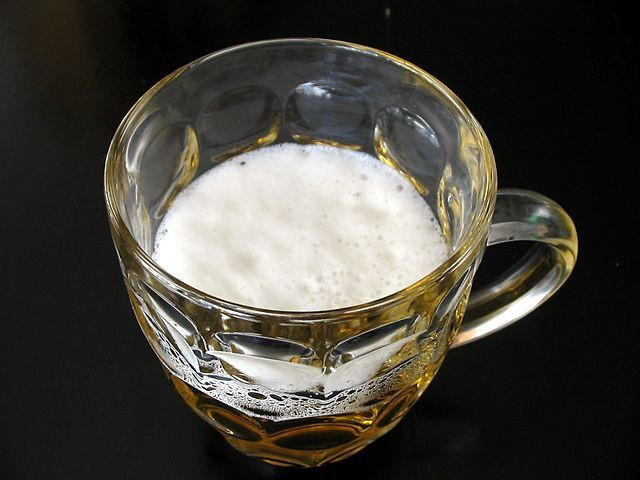Beer May Help Your Heart Health, One Bottle At A Time

Right now, in every bar across this country, someone is encouraging their friends to have another because "it's been proven to be good for you." Whether or not they can quote an exact study or locate the university where tests have been done, many people believe that "moderate consumption" improves mood (certainly in the short term!), helps digestion, and is 'good for the heart.' In fact, some happy drinkers go so far as to claim that beer will lower your chance of a heart attack.
Well, researchers in Athens, Greece decided to test those very claims. To explore the effect of beer consumption on cardiovascular (CV) risk, they brought in 17 healthy, non-smoking men in their 20s and 30s in order to study how they were affected by the individual components of beer — alcohol and antioxidants.
On three separate occasions and at least one week apart, the men drank either beer (just under a pint), "near" beer (no alcohol), or vodka (an amount equal to the alcohol content of the beer). The researchers then measured their cardiovascular health within an hour or two of each drink. Specifically, they tested endothelial function (a measure of how easily blood passes through major arteries), aortic stiffness (a measure of whether blood vessels are beginning to harden), pressure wave reflections, and aortic pressure (a measure of blood pressure nearest the heart) — all of these being the established predictors of CV risk.
What did they find?
Aortic stiffness was similarly and significantly reduced by all three test drinks. However, beer consumption alone significantly improved endothelial function. Although all three test drinks significantly reduced wave reflections, the reduction was higher after beer consumption compared with dealcoholized beer. In short, the evidence indicates that beer improves blood flow to the heart in healthy non-smokers within a couple hours after drinking.
Beer, which is made from grains, water, and yeast, naturally contains antioxidants and this, apparently, is the key. The researchers believe the "additive or synergistic effects of alcohol and antioxidants" may be responsible for the healthy effects of the beverage. And this is certainly good news in America, where the rates for both beer drinking and cardiovascular risk are high.
The Details
According to the Beer Institute, those over the age of 21 drank an average of 300 beers in 2012. Overall, as compared to the previous year, beer consumption rose by 1.5 percent in 2012 and the five states with the highest per capita beer rate were:
1. North Dakota
2. New Hampshire
3. Montana
4. South Dakota
5. Wisconsin
Unfortunately, even with beer's positive impact on cardiovascular health, heart disease still has a profound impact in the U.S., where, every year, 600,000 people die of it.
In other words, heart disease causes one out of every four deaths, according to the Centers for Disease Control and Prevention. The leading cause of death for both women and men, heart disease also understands no racial bounds: for most ethnicities, it is the leading cause of death and for those groups where cancer is at the top, the percentage of deaths caused by heart disease is still astonishing: American Indians or Alaska Natives 18 percent, hispanics 20.8 percent, asians or pacific Islanders 23.2 percent, African Americans 24.5 percent, and whites 25.1 percent.
Perhaps moderate drinking has a different effect on those who already have a history of heart disease?
The Elderly
Although moderate alcohol consumption is related to a reduction of mortality, this has not been established for the elderly, especially for those with a history of congestive heart failure (CHF). Leading to coronary artery disease, the most common type of heart disease in the U.S. (and the cause of heart attack, angina, heart failure, and arrhythmias), CHF leaves the heart too weak or stiff to fill and pump efficiently. A group of Italian researchers wanted to verify the effect of moderate alcohol consumption on mortality rates in elderly participants both with and without CHF.
Working with 1,332 participants aged 65 and older, the researchers considered the effects of moderate alcohol consumption and 12-year mortality rates. The participants lived in communities ranging across five separate regions in Italy where the favored alcoholic beverage is wine. The researchers found that, among the participants without CHF (947 participants), mortality was 42.2 percent in drinkers versus 53.7 percent in non-drinkers. In contrast, in the presence of CHF (117 participants), mortality was 86.5 percent in drinkers versus 69.7 percent in non-drinkers.
"Our data demonstrates that moderate alcohol consumption is associated with an increased long-term mortality risk in the elderly in the presence of CHF," the researchers wrote. One unexplored path in this particular experiment has to do with beverage; if the participants had been drinking beer instead of wine, the mortality rates might have been different.
New study, anyone?
Sources: Gargiulo G, Testa G, Cacciatore F, et al. Moderate alcohol consumption predicts long-term mortality in elderly subjects with chronic heart failure. The Journal of Nutrition, Health & Aging. 2013.
Karatzi K, Rontoyanni VG, Protogerou AD, et al. Acute effects of beer on endothelial function and hemodynamics: A single-blind, crossover study in healthy volunteers. Nutrition. 2013.
Published by Medicaldaily.com



























